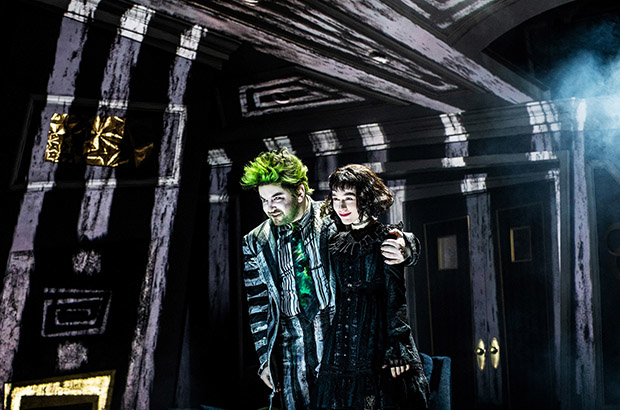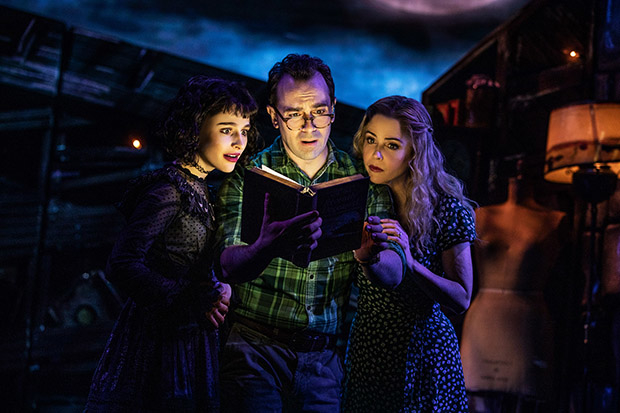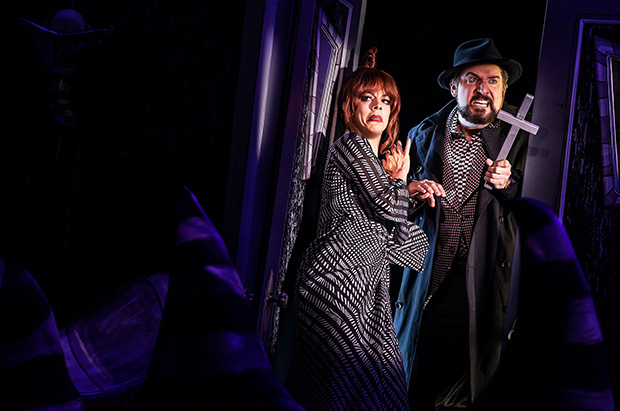In Beetlejuice, Intermission Come and Me Wan' Go Home
Tim Burton’s classic film takes the stage, but the production trades ’80s kitsch for millennial crassness.

(© Matthew Murphy)
Let's talk about the good stuff first. The design of Beetlejuice at the Winter Garden Theatre is the most exciting of the season. Inspired by the DIY aesthetic of director Alex Timbers, the creative team — comprising David Korins (sets), William Ivey Long (costumes), Kenneth Posner (lighting), Peter Nigrini (projections), and Michael Curry (puppets) — has come up with some truly imaginative ways of reimagining the macabre world of Tim Burton for the Broadway stage.
Korins provides a massive Victorian farmhouse that undergoes two major transformations until it becomes a nightmare hellscape. Long smartly reimagines iconic outfits, like the title character's black-and-white stripes, in ways that don't feel like Halloween costumes. Posner accentuates the stage in green and purple neon, while Nigrini finds sensational ways of conveying Burton's jagged-edged style of filmmaking to aid in transitions. Curry gives us a series of delightfully demented puppets, including a murderous pig that will keep you off bacon for a while.
It's hard not to wish that the rest of this disappointing new musical were up to their level of creativity. Instead, book writers Scott Brown and Anthony King (Gutenberg! The Musical!) and composer Eddie Perfect (King Kong) have created a show that's at odds with its own existence. It can't decide whether it wants to be a faithful representation of the 1988 film or a wholly new entity. It doesn't know if it should aim for the teen audience or the rated-R crowd. At times, it doesn't even seem like it wants to be a musical. Much like the title character himself, nothing about Beetlejuice justifies why it really deserves life.
Which is weird, since life is all that matters to Beetlejuice (Alex Brightman), the maniacal ghost who's tired of only being visible to dead people. He's desperate to be seen, and all he has to do is get a living person to say his name three times. Lydia Deetz (Sophia Anne Caruso), a teenager grieving the death of her mother, is his prime target.
On celluloid, Beetlejuice and Lydia were supporting roles in the story of Adam and Barbara Maitland (here played by Rob McClure and Kerry Butler), a small-town couple who die in a tragic accident. When a pair of social-climbing city dwellers and their Goth daughter move into the Maitlands' home, the Maitland ghosts haunt them out, with the help of Lydia and the devious phantom they summon from hell.

(© Matthew Murphy)
Onstage, Brown and King turn Beetlejuice and Lydia into the protagonists. He becomes the fourth-wall-breaking narrator craving to escape from the netherworld, while she becomes the emotional center of a potentially moving story about a young woman and her distant father (Adam Dannheisser plays Charles Deetz, a real-estate developer), both of whom eventually find togetherness after a terrible loss.
What they have not figured out, though, is what to do with literally everyone else, and how to interpolate all of the fan service that the show's target audience is expecting (look out for cameos from a sandworm, a shrunken-headed hunter, and a deceased Miss Argentina, who gets a whole dance number).
In refocusing the plot, they've turned the Maitlands into such purposeless figures that they don't really need to be there (McClure and Butler make the most of their stage time, but they're too talented for this third-string treatment). Dannheisser's Charles becomes a wallflower when he really needs to make a connection that tugs at the heartstrings. Leslie Kritzer is perfectly cast in a retooled version of Catherine O'Hara's role, Delia; Brown and King have transformed Charles's psychotic art-snob wife into a kooky New Age life-coach girlfriend. But even Kritzer, who is known for being able to make just about anything funny, has a hard time here.

(© Matthew Murphy)
While Michael McDowell and Warren Skaaren's screenplay relied on ghoulish irony to earn giggles, Brown and King go for easy laughs in the form of tactless gross-outs. Timbers directs the cast to look disgusted at certain cringe-worthy jokes that they know won't land. The rest of the gags, some of which are focused on kale salad and Trader Joe's, are the definition of "2000 and late." They'd almost be able to get away with it if Perfect's score was memorable, but it's so generic that the songs you walk out humming are Harry Belafonte's "Day-O (The Banana Boat Song)" and "Jump in the Line," both of which were used to better effect in the movie.
If there was a Tony Award for "Hardest Working Performer," Brightman and Caruso would be front-runners. He rarely leaves the stage, contorts his voice into a permanent smoker's rasp, and makes a meal out of the most awkward of moments. Caruso has an even more difficult task. At 17, she has to belt multiple pop ballads to the balcony, alone on an empty stage (a task that's usually only reserved for a Patti LuPone). Her voice still has that a teenage wispiness, which gives the song an impressively raw and vulnerable quality. But it's almost unfair how dwarfed she is on that massive stage.
While Timbers and the design team have done a masterful job building the world of this cult classic for a new medium, the writers haven't cracked it even slightly. You know there's a problem when intermission comes and you wan' go home.







